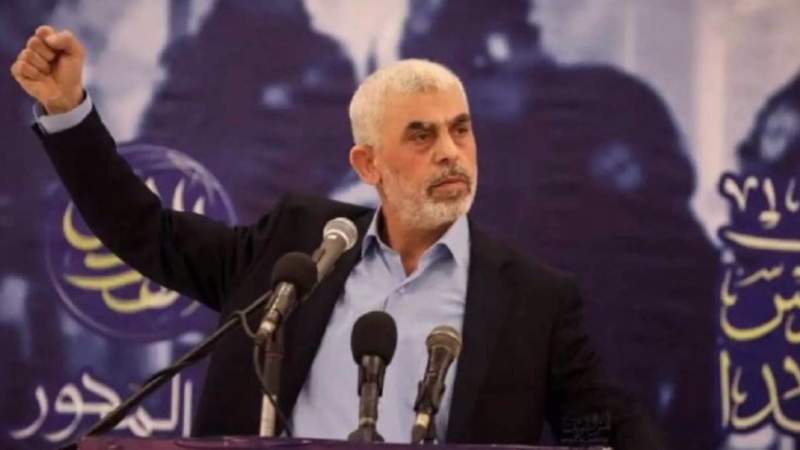'Fearless Leader': Netizens Pay Tribute to Yahya Sinwar as He Goes Down Fighting

News - Middle East: Social media users have reacted to the news of the martyrdom of Hamas leader Yahya Sinwar.
Sinwar was found dead in southern Gaza’s Rafah city on Thursday, wearing a combat vest with an AK-47 rifle by his side.
The charismatic leader of the Palestinian resistance movement escaped many assassination attempts before and after the events of October 7.
In the past year, Sinwar, 62, played an instrumental role in coordinating and supervising Operation Al-Aqsa Flood in Gaza.
Before becoming Hamas’s leader in Gaza in 2017, Sinwar spent 22 years in an Israeli prison. He was released as part of a prisoner swap in 2011.
Award-winning British journalist Afshin Rattansi wrote that “contrary to all the propaganda in US, UK, and EU media for the last year Hamas Leader Yahya Sinwar didn’t end up meeting his end in a tunnel surrounded by Israeli hostages wearing a suicide belt.”
“He was killed on the frontlines wearing the Palestinian Keffiyeh around his neck and a tactical vest, wielding an AK-47, while fighting Israeli occupation forces head on, as the rest of the Palestinian resistance had been doing in Gaza for the last year,” he added.
Journalist and filmmaker Dan Cohen wrote, “Yahya Sinwar was a fearless leader who defied the Israeli occupation and prepared the Palestinian resistance for liberation. He was the exact opposite of the Israeli leadership that is celebrating today.”
Palestinian social media activist Nerdeen Kiswani tweeted: “A minute of living with dignity and pride is better than a thousand years of a miserable life under the boots of the occupation.” - Yahya Sinwar from his novel, The Thorn and the Carnation
Nour Zeidan tweeted that “Yahya Sinwar was found above ground, he was not hiding in a tunnel or among civilians; instead, he was with his fighters at the front line.”
“Our martyrs are not our weakness or shame, they are our pride and strength. Our liberation and resistance continues. Rest in peace,” he added.
Omar from Gaza tweeted, “We will all walk the path of resistance and the path of Sinwar. If they kill Sinwar today, a hundred Sinwars will emerge to take his place.”
“If Israel thinks that by killing Yahya Sinwar it will stop the Palestinians from defending their land, it is mistaken. Israel has killed hundreds of leaders, including Yasser Arafat (Abu Ammar), Ahmed Yassin, Abdul Aziz al-Rantisi, Abu Ali Mustafa, Ismail Haniyeh, and many other leaders,” he stated.
“But the result has always been the opposite: the resistance grows fiercer, stronger, and more determined,” he wrote.
Journalist Mr. Haque wrote, “History will remember Yahya Sinwar as a 62-year-old brave courageous man who fought for his people, for his land and for Al-Quds till his last breath against the Firoun of his time. Ya shaheed As salam.”
An account called Red Collective wrote this about the martyred Hamas leader in these words: “In 1948, Yahya Sinwar's family were attacked and expelled from Gaza by Israel. Growing up, he saw friends and family killed in other Israeli war crimes. Even if he is now dead, the ongoing Israeli atrocities have created thousands more like him - fighters for Palestinian freedom.”
Journalist Elijah J. Magnier wrote, “Yahya al-Sinwar’s selection as the head of Hamas, despite knowing the likelihood of being killed on the battlefield, was a deliberate choice aimed at sending a powerful message to the people of #Gaza.”
“His decision to remain at the forefront of the conflict highlighted his willingness to share the same risks and sacrifices as the civilians and fighters of Gaza, reinforcing the idea that Hamas’s leaders would not abandon their people in times of hardship,” he stated.
“Sinwar’s death, while a significant loss to Hamas, serves a symbolic purpose. It communicates to the people of Gaza that their commanders are as committed as they are and that they too are prepared to face the ultimate sacrifice. By dying in battle, Sinwar likely sought to emphasize that Hamas, as a movement, will endure even if its leaders are killed, because the ideology and cause of resistance persist through the people,” he said.
“In this sense, Sinwar’s death could be interpreted as a moral victory over Israel, as it reinforces his connection to the people of Gaza and his commitment to their cause. His message—that Hamas’s leadership shares in the sacrifices of the conflict—strengthens the bond between the group and the Gaza population, ensuring that the movement remains resilient despite the loss of its leaders,” he concluded.
Palestinian surgeon Doc Jazz wrote, “The Resistance continues because it is a just cause, not a man. That said, he was a man that made practically any other man look like a little boy, and he died fighting, not hiding.”
Sinwar had been chosen as Hamas’s overall leader after Ismail Haniyeh’s killing.
Haniyeh was assassinated in late July in a targeted killing operation against the Iranian capital Tehran, to which he had traveled to attend the inauguration ceremony of the Islamic Republic’s new President Masoud Pezeshkian.
Source: Press TV
#Hamas #Gaza About 2 months-
05:52
Sayyed Abdulmalik calls on Yemeni people to take part in a massive, honorable, and monumental march tomorrow, marking a full year since the American aggression supporting the Israeli enemy.
05:52
Sayyed Abdulmalik: The broad and remarkable rallies of our great people send a powerful message, making continued participation critically important.
05:51
Sayyed Abdulmalik: Battle between us and the Israeli enemy is escalating, requiring greater effort, popular presence, and active engagement that reflects steadfastness and resilience.
05:45
Sayyed Abdulmalik: The American and Israeli push to dominate our region is part of their Zionist project and the strategy they rely on in their policies.
05:45
Sayyed Abdulmalik: We take our stance of resistance in response to Allah and with trust in Him, understanding that danger and disgrace lie in complacency and neglect of our responsibilities.





